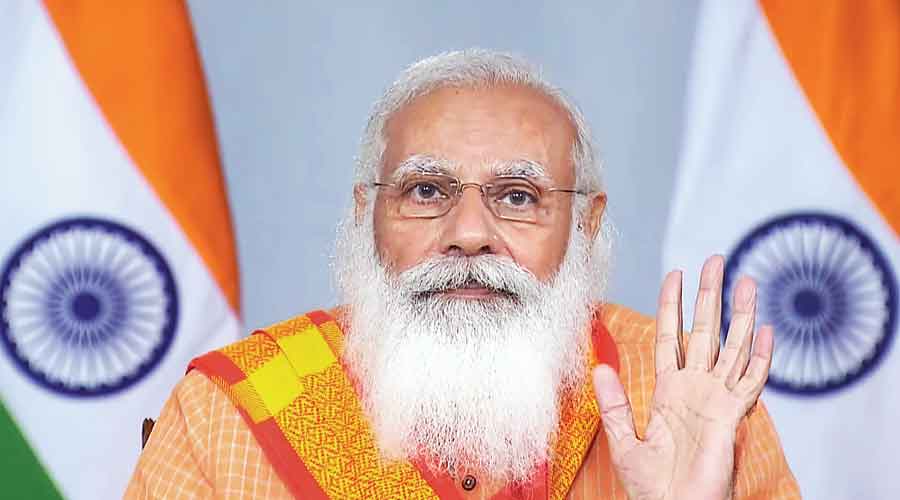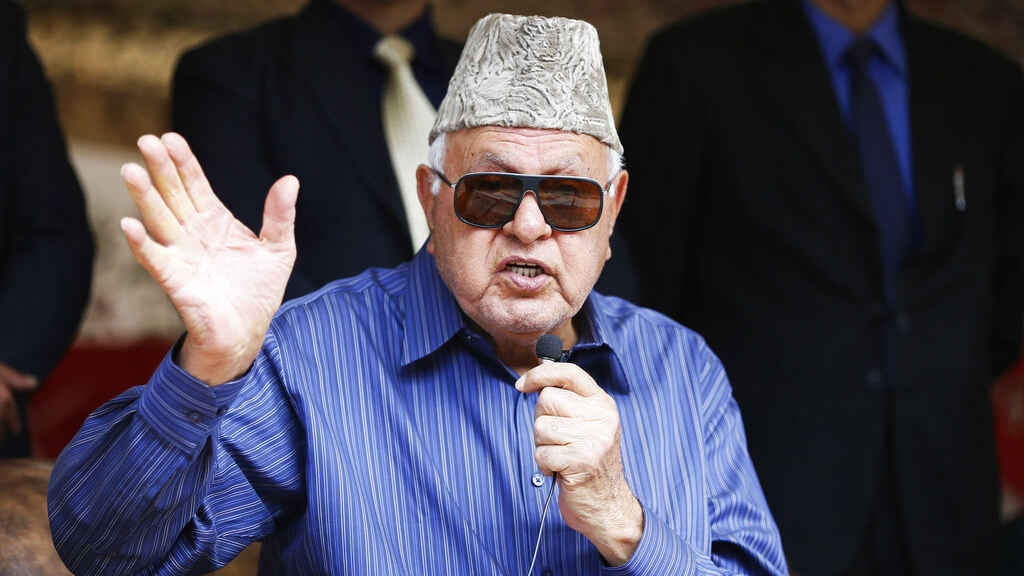Prime Minister Narendra Modi on Thursday shed the BJP’s iron-fist approach and chose to soothe emotional differences during his meeting with Valley politicians that was seen in party circles as an effort to “stoop to conquer” to achieve the saffron establishment’s long-term goal of building a “Naya (new) Kashmir”.
During the first such outreach effort after his government in one fell swoop stripped Jammu and Kashmir of its special status and turned it into a Union Territory in August 2019, Modi was learnt to have put his politest foot forward.
“Hum Dilli ki doori bhi mitana chahte hain aur dil ki doori bhi (We want to reduce the distance with Delhi and also the distance between hearts),” the Prime Minister was quoted as telling the leaders by sources.
According to the sources, Modi stressed that he was always available for the people of Kashmir.
In BJP circles, Modi’s overture was viewed as a tactical step back to achieve the long-term goal of “political integration” of Jammu and Kashmir and the saffron establishment’s aim of building a “new Kashmir”.
Modi, however, obliquely told the leaders that the Centre’s decision to annul Article 370 provisions to end Jammu and Kashmir’s special status was cast in stone and instead focussed on moving ahead to complete the process of redrawing Assembly constituencies and hold elections.
Convening the meeting with the five-party alliance fighting for the restoration of Jammu and Kashmir’s special status, including Mehbooba Mufti’s People’s Democratic Party and Farooq Abdullah’s National Conference, was seen as an admission of failure of the Modi government at a time its strongarm tactics had created massive resentment in the region and triggered worldwide criticism.
“Sometimes you have to stoop to conquer,” a BJP leader said when asked about the government’s move to host the very leaders it had put under house arrest and doggedly tried to discredit earlier.
BJP leaders said the government’s priority now was to secure the support and participation of all political parties to complete the delimitation process to redraw constituencies and hold elections to exhibit to the world its commitment for democratic process.
The government and the BJP apparently want to redraw the Assembly and Lok Sabha constituencies in a way that favours the ruling party and the aim now is to achieve the goal without much opposition.
In his address at the meeting, both Modi and Union home minister Amit Shah promised to hold elections once the delimitation exercise is over and also restore statehood to Jammu and Kashmir, but no clear timeline was promised.
“Our goal of scrapping Article 370 (provisions) without much turmoil has been achieved. The next step is to move slowly and make the people and the political parties accept this irreversible reality peacefully and move forward,” a BJP general secretary said.
The sources said the leaders of the five-party Gupkar alliance were allowed to speak freely at the meeting and even make a case for their main demand of restoration of special status.
“They (the alliance leaders) have the right to present their demand but they also know that it can’t be accepted and the only option is to leave the past behind and move forward,” a BJP leader said. This leader added that the meeting was to give an opportunity to the Valley leaders to vent their frustration and move on.
The five parties that make up the People’s Alliance for Gupkar Declaration had earlier been vilified as the “Gupkar gang” by none less than Union home minister Shah and its leaders termed dynasts, corrupt and anti-national.
After ending Kashmir’s special status, which the BJP believes had alienated the region from the rest of the country, the party is now working tactically to get a political foothold to push its “nationalist agenda”. In BJP circles, leaders often talk about building a “Naya Kashmir” without clarifying what it exactly means.
Initially, the BJP had hoped to discredit and edge out the traditional leadership of Jammu and Kashmir and build an alternative leadership. However, with those efforts faltering, the party appears to have chosen to engage with them.
“The Prime Minister’s move to convene an all-party meeting is a welcome step. It shows the central government’s commitment to take the democratic process forward after holding the panchayat and district development council elections,” the BJP general secretary in charge of Jammu and Kashmir, Tarun Chugh, had said over the phone on Wednesday.
Chugh, however, disconnected the line when this correspondent asked about the Prime Minister meeting leaders of what the BJP had dubbed the “Gupkar gang”, baring the unease in the party over the compulsions of engaging with those it had tried to decimate.
Some BJP leaders are also viewing the Kashmir overture as another diversion from the “negativity” being spread against the government over the Covid mismanagement and economic woes.
BJP leaders, however, pointed to the date of the meeting called by the Prime Minister to rule out any leniency over the ideological firmness with regard to Article 370.
“Today (June 23), all our top leaders marked the ‘Punya Tithi’ (death anniversary) of (party ideologue) Syama Prasad Mookerjee and the meeting is scheduled for tomorrow,” a leader had said on Wednesday.
The scrapping of Jammu and Kashmir’s special status has been termed as the fulfilment of the “dream” of Mookerjee, one of the founders of the Jana Sangh that is the BJP’s predecessor.
“Remembering Dr Syama Prasad Mookerjee on his Punya Tithi.… His efforts towards national integration will never be forgotten,” Modi tweeted on Wednesday.
BJP chief J.P. Nadda wrote a newspaper article to remember Mookerjee and hailed Modi and Shah’s “iron will” on removing Jammu and Kashmir’s special status, and the fulfilment of Mookerjee’s dream of “One Vidhan (One Constitution), One Pradhan (One Prime Minister) and One Nishan (One emblem)”.












